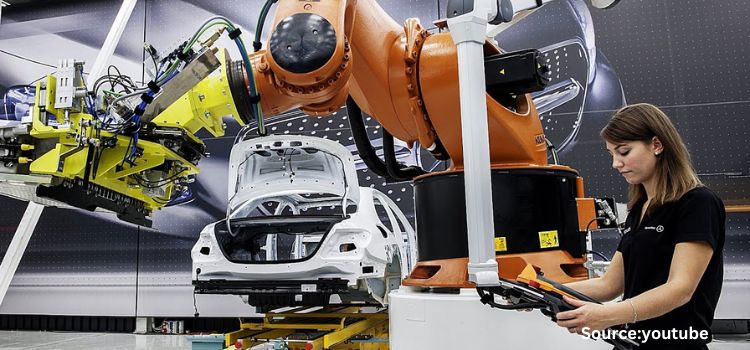
Automotive PCB Market by PCB Type (Single-Sided PCB, Double-Sided PCB, Multi-Layer PCB, HDI (High-Density Interconnect) PCB, Flexible PCB, and Others), by Technology (Surface Mount Technology (SMT) and Through-Hole Technology), by Material (FR-4, PTFE, and Ceramic), by Application (Powertrain & Engine Control, Body and Lighting, Infotainment, and Chassis), and by Sales Channel (Original Equipment Manufacturer (OEM) and Aftermarket – Global Opportunity Analysis and Industry Forecast, 2025–2030
US Tariff Impact on Automotive PCB Market
Trump Tariffs Are Reshaping Global Business
Automotive PCB Market Overview
The global Automotive Printed Circuit Board (PCB) Market size was valued at 10.61 billion in 2024 and is predicted to reach 14.72 billion by 2030 with a CAGR of 5.6% from 2025-2030.
Automotive PCB market is fueled by increasing use of electric vehicles, adoption of advanced driver assistance systems and increasing demand for connected and intelligent vehicles. Increased production and material costs, however, are proving to be growth restraining factors in the market. Market leaders such as Zhen Ding Technology Holding Limited, Unimicron Technology Corporation and Shengyi Technology Co., Ltd. are also emphasizing innovation and strategic partnerships to dominate the market. Besides, growth in 5G connectivity and autonomous driving innovations are among the top future opportunities for the market.
Increasing EV Adoption Fuels Market Growth
The rapid expansion of electric vehicles (EVs) sector is driving the automotive printed circuit board (PCB) market demand globally. EVs are heavily reliant on advanced PCBs for battery management systems, power electronics, and inverters, which are critical for efficient energy distribution and vehicle performance.
As indicated in a recent report by the International Energy Agency, China experienced a remarkable surge in new registrations of electric vehicles in 2023 to about 2.7 million units from 1.7 million units in 2022, an 80% rate of increase.
In addition, the U.S. also observed EV registration growth with 0.3 million new EVs registering in 2023 versus around 0.2 million units in 2022 with a growth rate of 50%. The electric vehicle adoption surge, particularly in large markets such as China and the U.S., will further fuel the need for premium automotive printed circuit boards, and hence the latter will further fuel market growth.
Rising Use of Advanced Driver Assistance Systems (ADAS) Propelling the Market
The growing need for Advanced Driver Assistance Systems (ADAS) is one of the key drivers for automotive printed circuit board (PCB) market growth. ADAS requires complex sensor networks, microcontrollers, and high-speed communications modules that are dependent upon multilayer and HDI PCBs in order to operate optimally. For instance, in February 2025, Semtech launched the RClamp10022PWQ, an Electrostatic Discharge protection IC for automotive Ethernet that is designed to guard high speed data interfaces against transient voltage pulses.
This technology is important to automotive PCBs where Ethernet transceivers are being incorporated to facilitate ADAS, infotainment and connected vehicle systems. Thus, the growing use of ADAS, infotainment and connected vehicle technologies is fueling demand for advanced automotive printed circuit boards as manufacturers seek to enhance safety, performance and data security in modern vehicles.
Growing Demand for Connected as well as Smart Automobiles Fuels the Market Growth
The growing requirement for intelligent and networked vehicles is the primary driving factor in the worldwide automobile printed circuit board market trends. Next-generation technologies such as vehicle-to-everything communication, real time navigation, in car infotainment systems and telematics applications are being incorporated on advanced cars, that require high performance PCBs to function appropriately.
For example, in January 2025, Texas Instruments introduced new edge AI enabled automotive audio processors and radar sensor for enhancing ADAS, in-cabin monitoring and audio experience. These devices with high performance are embedded in automotive PCBs by enabling real time data processing, object detection and sound management.
Growing demand for networked and intelligent cars is driving the market as latest technologies such as ADAS, V2X communication and telematics solutions continue to remain reliant on high-performance PCBs to offer highest functionality.
High Manufacturing and Material Expenses Restrains the Market Growth
High material and production expenses are the biggest restraint in the global automotive printed circuit board market. The use of advanced materials such as high-grade laminates and metal-based substrates, and the inclusion of high-density interconnect and multi-layer PCBs, increases the production cost. Such added expenses render automotive PCBs more expensive, particularly in budget-friendly vehicles, that prevents greater market acceptance and growth.
Evolution of 5G Connectivity in Automotive Systems
The increasing use of 5G connectivity in car systems is a major future opportunity for the industry. With the world becoming more and more interconnected, there will be a demand for high-speed data transfer to enable applications such as autonomous driving, real time V2X communication, and sophisticated infotainment systems.
For instance, in December 2024, Nexperia introduced miniaturized leadless logic ICs, that were designed to make space ideal and more robust for automotive applications. The increasing incorporation of 5G connectivity in automobile systems as the need for high-speed data transmission to enable features including autonomous driving and intelligent infotainment systems is expected to grow.
Market Segmentations and Scope of the Study
The automotive PCB market report is segmented based on PCB type, technology, material, application, and sales channel. By PCB type, the market includes single-sided PCB, double-sided PCB, multi-layer PCB, HDI (High-Density Interconnect) PCB, flexible PCB, rigid-flex PCB, and metal core PCB. In terms of technology, the market is categorized into surface mount technology (SMT) and through-hole technology. By material, the market is divided into FR-4 (Flame Retardant 4), PTFE (Polytetrafluoroethylene), and ceramic. Based on application, the market is segmented into powertrain & engine control, body and lighting, infotainment, ADAS (Advanced Driver Assistance Systems) and safety, and chassis. The sales channel segmentation consists of original equipment manufacturer (OEM) and aftermarket. Regional analysis includes key regions such as North America, Europe, Asia-Pacific, and the Rest of the World (RoW).
Geographical analysis
Asia Pacific dominates the automotive PCB market share over the forecast period due to the growing adoption of electric vehicles. As EV production is on the rise the demand for the high-end PCBs used in the electrical systems of the vehicles keeps growing. According to a report by Our World in Data in 2023, the sales of new cars in India totalled approximately 82,270 units, a whopping 71% increase from 48,023 units in 2022. This growth in the use of EVs is driving innovation in printed circuit board technologies and thus driving market growth in the entire region.
Moreover, presence of dominant players such as Zhen Ding Technology Holding Limited, Unimicron Technology Corporation and Shengyi Technology Co., Ltd. is propelling the Asia-Pacific automotive printed circuit market growth. These firms are investing in cutting-edge PCB solutions, expanding production capacities, and developing innovation to cater to the growing demand for high performance electronics in automobiles today.
For instance, on October 29, 2024, DuPont partnered with Zhen Ding Technology Group to promote high end PCB technology in automotive electronics use cases. With the merger of DuPont's thermal management and advanced interconnect experience and Zhen Ding's smart manufacturing capabilities, the partnership is aiming at high reliability PCBs that are so vital to EVs, autonomous driving and connected vehicles. Their competitive and technological advancements are driving the growth of the market that is turning the region into a hub for automotive PCB manufacturing.
On the contrary, North America shows a steady increase in the automotive PCBs market over the forecast period. This is due to government regulations and safety standards by administrative bodies such as the National Highway Traffic Safety Administration and the Environmental Protection Agency that are imposing strict safety and emission standards particularly with ADAS mandates, electronic stability control and crash avoidance systems.
For example, NHTSA promulgated regulations such as the Federal Motor Vehicle Safety Standards mandating the fitting of safety features such as ADAS and ESC in vehicles. These features utilize PCBs heavily to operate that is causing the demand for printed circuit boards in cars to rise.
In addition, advancements in autonomous and connected vehicle technologies are driving the growth of the market in region. These vehicles rely heavily on high performance printed circuit boards to support key systems such as LiDAR sensors, radar, cameras and central computing units essential for ADAS.
For instance, in January 2025, Aeva introduced the Atlas Ultra, its slim, high resolution 4D LiDAR sensor designed for SAE Level 3 and 4 automated driving, the sensor offers up to three times the resolution of its predecessor, Atlas. With a range of up to 500 meters the Atlas Ultra is optimized for passenger vehicles with minimal impact on vehicle design, enhancing safety and automation with advanced AI based perception capabilities. Consequently, the expansion of this technology sector is significantly boosting the automotive PCB market in the region.
Competitive Landscape
The key players operating in automotive PCB industry is Zhen Ding Tech. Group Technology Holding Limited, Unimicron Technology Corporation, TTM Technologies Inc., Compeq Co., Ltd., SHENGYI TECHNOLOGY CO., LTD., Schweizer Electronic AG, MEIKO ELECTRONICS Co., Ltd., Shennan Circuits Company Limited, Garland Technology, LLC, Rogers Corporation, Ventec International Group, Hannstar Board Corporation, Flex Ltd., Jabil Inc., Nutanix, Inc., and others.
Key Benefits
-
The report provides quantitative analysis and estimations of the automotive PCB market from 2025 to 2030, which assists in identifying the prevailing market opportunities.
-
The study comprises a deep-dive analysis of the automotive PCB industry including the current and future trends to depict prevalent investment pockets in the market.
-
Information related to key drivers, restraints, and opportunities and their impact on the automotive PCB industry is provided in the report.
-
Competitive analysis of the players, along with their market share is provided in the report.
-
SWOT analysis and Porters Five Forces model is elaborated in the study.
-
Value chain analysis in the market study provides a clear picture of roles of stakeholders.
Automotive PCB Market Key Segments
By PCB Type
-
Single-Sided PCB
-
Double-Sided PCB
-
Multi-Layer PCB
-
HDI (High-Density Interconnect) PCB
-
Flexible PCB
-
Rigid-Flex PCB
-
Metal Core PCB
By Technology
-
Surface Mount Technology (SMT)
-
Through-Hole Technology
By Material
-
FR-4 (Flame Retardant 4)
-
PTFE (Polytetrafluoroethylene)
-
Ceramic
By Application
-
Powertrain & Engine Control
-
Body and Lighting
-
Infotainment
-
ADAS (Advanced Driver Assistance Systems) and Safety
-
Chassis
By Sales Channel
-
Original Equipment Manufacturer (OEM)
-
Aftermarket
By Region
-
North America
-
U.S
-
Canada
-
Mexico
-
-
Europe
-
The UK
-
Germany
-
France
-
Italy
-
Spain
-
Denmark
-
Netherlands
-
Finland
-
Sweden
-
Norway
-
Russia
-
Rest of Europe
-
-
Asia-Pacific
-
China
-
Japan
-
India
-
South Korea
-
Australia
-
Indonesia
-
Singapore
-
Taiwan
-
Thailand
-
Rest of Asia-Pacific
-
-
RoW
-
Latin America
-
Middle East
-
Africa
-
Key Players
-
Zhen Ding Tech. Group Technology Holding Limited
-
Unimicron Technology Corporation
-
TTM Technologies Inc.
-
Compeq Co., Ltd.
-
SHENGYI TECHNOLOGY CO., LTD.
-
Schweizer Electronic AG
-
MEIKO ELECTRONICS Co., Ltd.
-
Shennan Circuits Company Limited
-
Garland Technology, LLC
-
Rogers Corporation
-
Ventec International Group
-
HANNSTAR BOARD CORPORATION
-
FLEX LTD.
-
Jabil Inc.
-
Nutanix, Inc.
REPORT SCOPE AND SEGMENTATION
|
Parameters |
Details |
|
Market Size in 2024 |
USD 10.61 billion |
|
Revenue Forecast in 2030 |
USD 14.72 billion |
|
Growth Rate |
CAGR of 5.6% from 2025 to 2030 |
|
Analysis Period |
2024–2030 |
|
Base Year Considered |
2024 |
|
Forecast Period |
2025–2030 |
|
Market Size Estimation |
Billion (USD) |
|
Growth Factors |
|
|
Countries Covered |
28 |
|
Companies Profiled |
15 |
|
Market Share |
Available for 10 companies |
|
Customization Scope |
Free customization (equivalent to up to 80 working hours of analysts) after purchase. Addition or alteration to country, regional, and segment scope. |
|
Pricing and Purchase Options |
Avail customized purchase options to meet your exact research needs. |

















 Speak to Our Analyst
Speak to Our Analyst





















